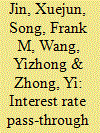| Srl | Item |
| 1 |
ID:
146201


|
|
|
|
|
| Summary/Abstract |
This article examines the trade effect of flexibility design features within preferential trading arrangements (PTAs). Using a gravity model of bilateral trade that incorporates multilateral trade resistance, we report three main results. First, unconstrained escape provisions undermine the effectiveness of PTAs when it comes to increasing trade. Second, adding some restrictions to these escape provisions more than offsets the negative effect of unconstrained escape, leading to more effective PTAs than those without escape options. Third, adding more restrictions beyond a certain point serves only to make PTAs less effective. Thus, both too much institutional flexibility and too much institutional rigidity reduces the ability of PTAs to promote trade. However, fitting these results to the descriptive data makes it appear that most PTAs would be even more trade effective if they included greater restrictions on the use of their escape provisions. Consequently, it appears that policymakers generally choose fewer escape restrictions than would be optimal in terms of trade performance.
|
|
|
|
|
|
|
|
|
|
|
|
|
|
|
|
| 2 |
ID:
133267


|
|
|
|
|
| Publication |
2014.
|
| Summary/Abstract |
Using the Phillips-Loretan approach, this paper verifies the degree and speed of pass-through and rigidity of different interest rates in China, as well as the response of private loan interest rates to other interest rates during 2002-2012. The results indicate that the long-term pass-through from the interbank offered rates and deposit and loan interest rates to the treasury bond rate is incomplete, but that the long-term pass-through to private loan interest rates is overshooting. The long-term pass-through from the deposit and loan interest rates to the overnight interbank offered rate is incomplete, while that to the interbank offered rates of other maturities is complete. The short-term pass-through and adjustment speed of interest rates exhibit asymmetry. Therefore, before considering a full liberalization of interest rates, it is important to further enhance the competition of the financial system and the function of different interest rate systems, such as the interbank market and bond market.
|
|
|
|
|
|
|
|
|
|
|
|
|
|
|
|